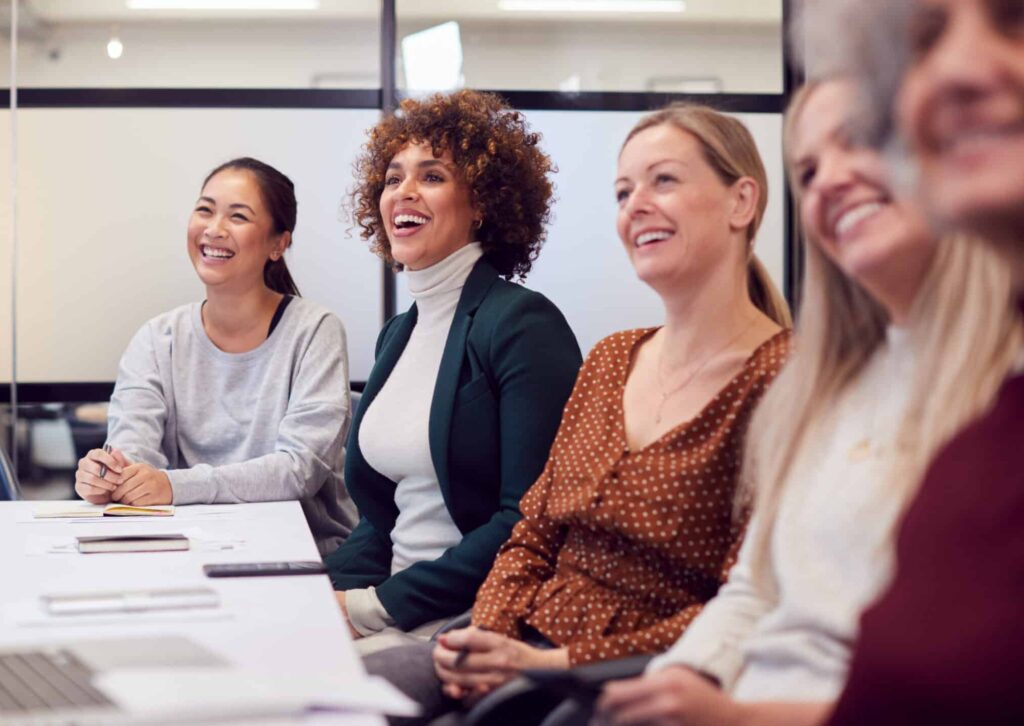International Women’s Day – insights from female leaders

Explore international women’s day over the years
International Women’s Day 2017: Insights from Female Leaders
Frazer Jones is proud to support International Women’s Day 2017. We interviewed several of our female clients to learn how they have been bold for change under the #BeBoldForChange campaign.
Christa Stienen, Senior Vice President Corporate HR at LSG Sky Chefs
Secrets to a Successful Career: “Networking is key. Be active, get involved, stay involved, and make yourself visible.”
Significant Barriers to Female Leadership: “Women often stand in their own way. Make a clear decision for your career and don’t let it depend solely on personal objectives.”
Challenges for Future Generations: “Don’t rest on the laurels of previous generations. Cherish their achievements and continue fighting for equal rights.”
NG Ying Yuan, Executive Director, Human Resources and Organisation Development at Singapore Economic Development Board
Advice for Aspiring Women: “Reflect on your life experiences and those around you to better support different workforce segments. Use your experiences to guide young talent, understand the need for flexibility, and empathise with career growth transitions.”
Leadership Lessons: “Shed your ego to serve well as a leader. Leadership is about serving people, teams, and the community. Accept help and advice to handle roles effectively.”
Amrita Chopra, HR Manager at Unilever
Barriers to Female Leadership: “Women themselves can be barriers to their success. They often feel the need to overcompensate and act ‘tough.’ Women should embrace their differences and not feel the need to mimic men to be seen as strong leaders.”
Career Advice: “Be clear about what you want and don’t want in your career. This clarity helps you control your career path, especially during personal life changes.”
Achieving Work-Life Balance: “Put yourself first and set boundaries. Ensure you have time for yourself outside of work and correct any slips that compromise this balance.”
Kate Meyer, HR Manager at Linklaters
Career Advice: “Have confidence in yourself and your abilities. Utilise available support systems like development programmes, mentors, and coaches to achieve your ambitions.”
Changes in Gender Diversity: “Over the last decade, there has been a significant focus on gender diversity. This commitment has led to improvements in gender balance at senior levels.”
Challenges for Future Generations: “Balancing a successful career and family life will remain a challenge. Although progress has been made, it will take time to fully overcome this challenge.”

International Women’s Day 2018: Insights from Female Leaders
Frazer Jones is proud to support International Women’s Day 2018. We interviewed several of our female clients to learn how they are pressing forward for gender parity under the #PressForProgress campaign.
Ruth Espina, Director, Human Resources Recruitment, Maximum Management/Frazer Jones
Past Progress: If you could tell your younger self one thing, what would it be and why? “Focus on a career and role that complements who you are, your value system, and what you enjoy doing most. When there is alignment between who you are and your work, you’ll find yourself doing work you are passionate about. Passion sets you up for success! Initially, I tried to mould myself into what the corporate world wanted me to be. When I learned to relax and use my approach and personality as a competitive advantage, I thrived. Supportive managers and a company culture that values diversity of thought made this possible. Today, it’s easier to be an ambitious woman with an opinion that is heard and respected. I would also tell my younger self to go into executive search sooner because I love it, but my hands-on HR experience has made me a better headhunter.”
Present Progress: If you were to be a mentor to someone within your profession, what one piece of advice would you give? “Actively listen – listen to understand, not to respond. This takes more time but engages your audience, showing them you hear them and can interpret their needs into meaningful results. This increases your credibility, a powerful position to be in.”
How is gender parity being achieved in your profession, and what needs to be done to press for progress? “Human Resources is progressive regarding gender balance. The challenge is driving progress in the broader businesses we operate in. HR is appealing to both genders and committed to equality. Flexible work schedules help working families of either gender. New compensation legislation in several states is expected to drive better pay parity over time. Our educational system needs to develop to meet future talent demands and position certain demographics for success. For example, STEM programmes targeting females and corporate recruiters attracting underrepresented talent will change the landscape.”
Future Progress: What kind of legacy do you wish to leave behind? “I want to be known for making an impact on the lives of those I interact with. Ensuring candidates and clients have an amazing experience and making great matches is the most gratifying part of working in search. Even after placing over 650 HR professionals in my nearly 20-year HR search career, I am still fulfilled when a client is thrilled by a great hire and a candidate is excited to start.”
Tugba Oncu, Head of HR, Novartis Gulf
Past Progress: If you could tell your younger self one thing, what would it be and why? “Take it easy on yourself and those around you. Ambition and striving for more are good qualities, but they can lead to unnecessary stress if you don’t accept life’s unpredictable hurdles. I was impatient and critical, expecting life to proceed as planned. Over the years, I learned to be kinder to myself. What matters is how we navigate challenging times, staying strong and positive for ourselves and our loved ones.”
Present Progress: Of the people that inspire you, what character traits do they have which you admire? “The most inspirational leaders are smart, humble, and operate with high integrity. They build trust and inspire their teams to go the extra mile.”
If you were to be a mentor to someone within your profession, what one piece of advice would you give? “Focus on your strengths and believe in yourself.”
What is your personal mantra? “To accept the things I cannot change, have the courage to change the things I can, and the wisdom to know the difference.”
Future Progress: What advice would you give aspiring women in your industry? “Ask for it! Women are often less demanding in the workplace, negotiating less on their packages and having fewer demands for promotions and developmental opportunities. They need to be confident about their contributions and more proactive in managing their careers.”

International Women’s Day 2019: Insights from Female Leaders
Frazer Jones is proud to support International Women’s Day 2019. This day celebrates the social, economic, cultural, and political achievements of women. While gender parity in the workplace has improved over the past decades, there is still a long way to go. As part of the #BalanceforBetter campaign on 8th March, we interviewed inspiring women to understand the role confidence has played in their careers.
Tracey Wardrope, Head of HR, BMT Global
Defining Confidence in the Workplace: “Confidence means feeling that your thoughts and suggestions have value due to your unique perspective, expertise, and experience. It’s about sharing them equally with your team or senior leaders.”
Impact of the Confidence Gap: “It can be intimidating to be in male-dominated meetings. Women often have to ensure they come across as balanced and objective.”
Improvement in Women’s Workplace Confidence: “Yes, there are more women in the workplace now, which statistically increases the likelihood of feeling supported.”
Importance of Confidence and Self-Belief: “Very important. You need the confidence to challenge and be an active part of discussions. Confidence in your convictions is crucial.”
Experiencing Imposter Syndrome: “Every day. Surround yourself with supportive people and take time to reflect on your achievements.”
Role of Risk-Taking: “I’m not much of a risk-taker. For me, it’s about hard work and having a strong team.”
Mentoring, Coaching, and Sponsorship: “Very important but still lacking. Things are improving for junior women, but middle management often feels forgotten.”
Building Confidence into Career Development: “Coaching, mentoring, and being part of visible projects are key.”
Ensuring Assertiveness Doesn’t Impact Perceptions: “Educate those with negative perceptions and coach women on translating their passion effectively.”
Olga McSweeney, Director for Strategic Projects, Tax Stream, BDO
Defining Confidence in the Workplace: “Confidence means believing in the value of your thoughts and suggestions and sharing them equally with everyone.”
Improvement in Women’s Workplace Confidence: “Yes, but representation at the top hasn’t increased as expected. The issues go beyond women’s self-perception.”
Importance of Confidence and Self-Belief: “Hugely important. Confidence and relationship-building have allowed me to bring something valuable to the table.”
Experiencing Imposter Syndrome: “Yes, especially when applying for new roles. Remind yourself that employers never get a candidate who ticks every box.”
Role of Risk-Taking: “Taking risks is crucial for career development. Sometimes you might not be in the right position to take big risks, but smaller risks can still help you grow.”
Mentoring, Coaching, and Sponsorship: “Women are often over-mentored and under-sponsored. Sponsorship involves using influence to help protégés access opportunities.”
Building Confidence into Career Development: “Organisations need robust systems to ensure equal access to sponsorship and opportunities.”
Rebecca Stevens, Global Head of Leadership & Learning, Clarks
Defining Confidence in the Workplace: “Confidence is believing in your ability to succeed and that you have something valuable to offer.”
Impact of the Confidence Gap: “It can prevent women from achieving their potential, making decisions, and taking action.”
Improvement in Women’s Workplace Confidence: “Awareness has grown, leading to more debate and focus on solving the issue.”
Importance of Confidence and Self-Belief: “Confidence and self-belief are key enablers for presence, impact, and authority.”
Experiencing Imposter Syndrome: “Yes, it’s natural. Remind yourself of your unique contributions and use techniques like the ‘power pose’.”
Role of Risk-Taking: “Risk-taking has been significant in my career development. Moving to new roles and locations has provided valuable experiences.”
Mentoring, Coaching, and Sponsorship: “These are crucial for growing confidence. Mentors and sponsors help women become more visible and navigate their careers.”
Building Confidence into Career Development: “Regular career development conversations, mentoring, coaching, and Women in Leadership programmes can help.”
Ensuring Assertiveness Doesn’t Impact Perceptions: “Challenge unconscious bias and coach women to be assertive in ways that feel genuine.”
Sarah Smith, Head of HR, ARI Fleet UK
Defining Confidence in the Workplace: “Confidence is your belief in your ability and judgement.”
Impact of the Confidence Gap: “It affects everyone but particularly women, making them less likely to volunteer for new projects or positions.”
Improvement in Women’s Workplace Confidence: “Yes, due to more female role models, improved childcare access, and academic success for girls.”
Importance of Confidence and Self-Belief: “Hugely important, especially in male-dominated environments.”
Experiencing Imposter Syndrome: “Yes, I remind myself of my achievements and that I do know what I’m doing.”
Role of Risk-Taking: “Risk-taking hasn’t greatly contributed to my career development. I’ve been considered in my decisions.”
Mentoring, Coaching, and Sponsorship: “Support from managers and colleagues has been invaluable.”
Building Confidence into Career Development: “Empower employees, provide training, and encourage conversations about mistakes as learning opportunities.”
Ensuring Assertiveness Doesn’t Impact Perceptions: “Communicate ideas clearly and calmly, avoid drama, and take a collaborative approach.”
Additional Insights from Other Leaders
Mentoring, Coaching, and Sponsorship: “Feedback is key to growth. Programmes like Aspiring Talent and Woman at Deutsche Bank support women in traditionally male-dominated careers.”
Role of Risk-Taking: “Risk-taking propels career development. Encourage your team to take risks and challenge the norm.”
Ensuring Assertiveness Doesn’t Impact Perceptions: “Focus on how assertiveness is used positively. Remove the filter of fear and speak up for what’s right.”
Confidence and Career Development: “Confidence is about belief and conviction. It’s essential for taking on career challenges and achieving goals.”
Experiencing Imposter Syndrome: “Everyone experiences it. Change your self-talk and remind yourself of your strengths.”
Building Confidence into Career Development: “Make it personal and address individual weak spots. Regular career development conversations and specific interventions can help.”

International Women’s Day 2020: Insights from Female Leaders
Frazer Jones is proud to support International Women’s Day 2020. This day celebrates the social, economic, cultural, and political achievements of women. While gender parity in the workplace has improved over the past decades, there is still a long way to go. As part of the #EachforEqual campaign, we interviewed inspiring women to understand their experiences and perspectives.
Sandi Sadek, Managing Director, Human Resources at a Global Bank
Experiencing Gender Stereotypes/Bias: “I have experienced gender bias in the workplace. Gender stereotypes are ingrained from an early age, with boys encouraged for assertiveness and girls often labelled as ‘aggressive’. These biases are carried into the workforce and reinforced by corporate culture, holding back women while rewarding men for the same behaviour. Women typically make up less than 20% of senior management positions. To challenge this, we need to bring awareness to the topic, train people to recognise ingrained biases, and call out gender bias when we see it.”
Approach to Parental Leave in 2020: “Parental leave is a huge opportunity for companies. Parents need leave, and improvements are needed globally. For example, the United States still does not offer paid maternity leave. In Asia, we have made progress, but more flexibility and options for parents are needed. Shared parental leave and equitable access for men to take parental leave are essential. As a working mother, flexibility and support from employers are crucial. Women can have it all, but not all at the same time. We need to support women through various stages of their careers with affirmative programmes and policies.”
Ting Smith, Regional HR Director, Asia Pacific & Middle East at Gensler
Equality in the Workplace: “Equality starts with a firm’s culture, leadership, and people fostering an inclusive and equitable environment. Firms need policies and guidelines, along with mechanisms like flexible working and coaching for paternity leave returnees, to enable equality.”
Impact of Social Media on Female Leadership: “Social media has provided a platform to celebrate women’s achievements and inspire future leaders. It has brought activism and a desire to challenge the status quo. While some movements have been positive, others less so, it has shone a spotlight globally that firms cannot ignore.”
Positive Changes for an Equal Workforce: “At Gensler, diversity is foundational to our culture. Our Communities of Leadership reflect senior roles and rotations across the firm, promoting equality. We have embedded equal employment opportunities supported by transparent policies and flexible working arrangements.”
Chiquita Wilson
Experiencing Gender Stereotypes/Bias: “As a woman in corporate America, I have experienced gender bias. Remaining confident in your work and practising positive self-talk helps combat this. Not taking things personally and focusing on the end goal is also important.”
Equality in the Workplace: “Equality means treating people fairly and ensuring everyone has the opportunity to succeed regardless of their differences.”
Mentoring Early Career Professionals: “Mentoring a minority in corporate America, I see similar challenges to those I faced. However, Diversity & Inclusion (D&I) efforts have brought awareness to issues previously ignored. Companies are now addressing microaggressions and their impact on interactions and the bottom line.”
Approach to Parental Leave in 2020: “Parental leave programmes should be a priority. Progress is being made, but more efforts are needed at the federal and state levels in the U.S.”
Impact of Social Media on Female Leadership: “Social media brings awareness of successful women, empowering the next generation. Seeing young female entrepreneurs on platforms like Instagram is particularly inspiring.”
Positive Changes for an Equal Workforce: “My company has created more opportunities for women in leadership, with more women participating in important conversations.”
Admired Business for Equality: “Facebook makes tremendous efforts to create an equal workforce, from recruiting to feedback practices. Despite media narratives, many women leaders at Facebook praise the company’s efforts.”
Glory DeSimone, Founder at Glory DeSimone & Associates
Experiencing Gender Stereotypes/Bias: “In the financial industry, I have seen improvements for women. Early in my career, I was often one of the few women on the management team. I would challenge dismissive behaviour by asking if they would want their daughters to experience the same.”
Equality in the Workplace: “True equality is achieved when the percentage of female executives matches that of men.”
Mentoring Early Career Professionals: “Women today have more company support, such as women’s resource groups and formal mentoring programmes. However, the competitive environment makes it harder for women to distinguish themselves.”
Positive Changes for an Equal Workforce: “Formal Diversity and Inclusion efforts, led by leadership and tied to rewards, are creating greater equality.”
Angela Franks, Executive Director
Equality in the Workplace: “I have worked in companies with gender equality, not by luck but by choice. Gender equality is about surrounding yourself with great people who are open and aware of unconscious bias.”
Approach to Parental Leave in 2020: “Flexible parental leave policies are essential. In my ideal world, we would publish salaries and make fathers take six months of leave to care for their newborns. This would drive real change.”
Positive Changes for an Equal Workforce: “Equality at home and equal participation in unpaid domestic duties lead to positive change. Flexibility and flexible working practices are key.”
Lisa Hershkowitz, Chief People Officer at KWI
Experiencing Gender Stereotypes/Bias: “In my early career, I earned less than male colleagues with the same experience. I realised I had to find my voice, not just for myself but for others who couldn’t find theirs.”
Equality in the Workplace: “Opportunities must be accessible to all, and decisions based on merit.”
Mentoring Early Career Professionals: “Mentors faced explicit inequality with less structural support. Today, there is more support, but we need more government-level support for parental leave.”
Impact of Social Media on Female Leadership: “Social media creates movements and forces conversations on important issues. It also provides a sense of community and support.”

International Women’s Day 2021: Insights from Female Leaders
Frazer Jones is proud to support International Women’s Day 2021. This day celebrates the social, economic, cultural, and political achievements of women. While gender parity in the workplace has improved over the past decades, there is still a long way to go. As part of the #ChooseToChallenge campaign, we interviewed inspiring women to understand their experiences and perspectives.
Andrea Bodstein-Walenciak
Skills and Attributes of Female Leaders: “Research shows that successful leaders score high on competence, humility, and integrity, traits often found in women. Women excel in reflecting on their actions, listening to all perspectives, integrating those perspectives, and giving credit to their teams.”
Choosing to Challenge: “It means having an obligation to call out inequality, disrespect, and bias, and not choosing to be silent.”
Ensuring a Seat at the Table: “Women should partner with powerful role models and mentors to get noticed. Networking in business as they do in their private lives can also help.”
One Thing Women Don’t Talk About Enough: “Using emotions to approach problems and trusting intuition for creative problem-solving.”
Greatest Strength: “My self-confidence and ability to provide a vision and ensure its execution.”
Overcoming Career Barriers: “I realised I didn’t need to be tough and emotionless to be successful. Being myself was enough.”
Importance of Choosing to Challenge: “Choosing to challenge is essential to create change and a more inclusive world.”
Andrea Collier
Skills and Attributes of Female Leaders: “Women tend to display greater empathy, act with emotional intelligence, and encourage collaboration, which are crucial for creating a culture of diversity.”
Choosing to Challenge: “I challenge the notion that anyone willing to work hard can freely opt for their desired profession and utilise their abilities.”
Lesson Learnt the Hard Way: “Realising my own gender biases and becoming more self-aware helped me become a better leader.”
Ensuring a Seat at the Table: “Increase visibility, promote achievements, build networks, and develop a clear career plan.”
Impact of Kamala Harris’ Appointment: “Kamala Harris is an inspiring role model, showing young girls and women that it is possible to achieve their aspirations.”
Greatest Strength: “My curiosity and ability to embrace and learn from different cultures.”
Next Goal: “To inspire peers and future leaders through continuous learning and coaching.”
Eleana Choy
Ensuring a Seat at the Table: “Don’t wait to be invited. Earn your place through leadership, skills, and accomplishments.”
Choosing to Challenge: “Stand up for what you believe in and challenge when you can have the greatest impact.”
Impact of Kamala Harris’ Appointment: “Kamala Harris is an inspiration, but personal mentors and role models have a more significant impact on my leadership journey.”
Importance of Choosing to Challenge: “By staying silent, we give indirect support to bias and discrimination. We must call out the unacceptable.”
Anne Brömel
Lesson Learnt the Hard Way: “Using my own methods to get heard in male-dominated meetings.”
One Thing Women Don’t Talk About Enough: “Women don’t talk enough about their achievements and ambitions.”
Greatest Strength: “Integrity and reliability are crucial for leadership.”
Importance of Choosing to Challenge: “We must make people aware of unacceptable behaviour and speak out about diversity, equity, and inclusion.”
Denise Dettore
Ensuring a Seat at the Table: “Sit at the table with confidence, make value-added comments, and deliver in your role.”
Overcoming Career Barriers: “Imposter syndrome held me back. Reminding myself of my achievements and surrounding myself with mentors helped me overcome it.”
Next Goal: “To continue making a positive impact through volunteering and professional work.”
Gracie Mercado
Choosing to Challenge: “Speak up when you see inequality and ensure diverse perspectives are included in meetings.”
One Thing Women Don’t Talk About Enough: “The importance of strong female support in the workplace.”
Impact of Kamala Harris’ Appointment: “Kamala Harris’ visibility makes it easier for future female leaders to know that leadership is possible.”
Holly E. Ciccarella
Lesson Learnt the Hard Way: “Knowing which battles to fight and when to let go.”
Greatest Strength: “Being a good listener and understanding people’s true meanings.”
Overcoming Career Barriers: “Building confidence through small wins and knowing my value.”
Ingrid D’Lima
Choosing to Challenge: “Break stereotypes, lead by example, and celebrate your achievements.”
Lesson Learnt the Hard Way: “Patience and managing disappointment are crucial.”
Ensuring a Seat at the Table: “Be authentic, speak your truth, and bring your best self to work every day.”
One Thing Women Don’t Talk About Enough: “Women don’t speak enough about their achievements and wins.”
Ingrid Pierce
Ensuring a Seat at the Table: “Prioritise sharing and developing great ideas and follow through with execution.”
One Thing Women Don’t Talk About Enough: “Women tend to underplay their professional accomplishments.”
Importance of Choosing to Challenge: “Leaders need to have a voice to empower others to find theirs.”
Marcela Niemeyer
Choosing to Challenge: “Celebrate women’s accomplishments and support each other to create an inclusive world.”
One Thing Women Don’t Talk About Enough: “Women don’t talk enough about their strengths and accomplishments.”
Greatest Strength: “Delivering results, enabling others to accomplish more, and supporting growth and development.”
Monique D. Jefferson
Lesson Learnt the Hard Way: “Showing vulnerability and being authentic helped me build deeper relationships and be more effective.”
Ensuring a Seat at the Table: “Proactively help leaders solve critical business problems without expecting anything in return.”
Impact of Kamala Harris’ Appointment: “Kamala Harris’ appointment shows young women of colour that their dreams are achievable.”
Rosalie Rukerebuka
Skills and Attributes of Female Leaders: “Women bring pragmatism, inclusiveness, negotiation, and teamwork to leadership.”
Lesson Learnt the Hard Way: “Learning to be comfortable with not being liked and striving for respect instead.”
Impact of Kamala Harris’ Appointment: “Kamala Harris’ appointment is inspirational, but societal and workplace changes are needed for more women to reach the top.”
Importance of Choosing to Challenge: “Challenge bias and discrimination respectfully to create a safe dialogue and remove bias.”
Susan Lauher
Choosing to Challenge: “Challenge biased thinking and normalise conversations around biases.”
Lesson Learnt the Hard Way: “Letting go of the need to master every skill and focusing on setting objectives and removing barriers.”
Ensuring a Seat at the Table: “Advocate for yourself, seek support, and model sponsorship, mentorship, and advocacy.”
One Thing Women Don’t Talk About Enough: “Women should be more direct about the choices they make as parents.”
Greatest Strength: “Balancing ideal and pragmatic approaches.”
Next Goal: “Completing a Masters in Organisational Leadership to gain new perspectives and improve business problem-solving.”
Tyese T. Battle
One Thing Women Don’t Talk About Enough: “Women don’t talk enough about their professional or personal ambitions due to stigma and guilt.”
Choosing to Challenge: “Courage is essential to challenge inequality and push for change.”
Ensuring a Seat at the Table: “Recognise and bring your unique perspective to the table, and allow your instincts to guide your business interactions.”


